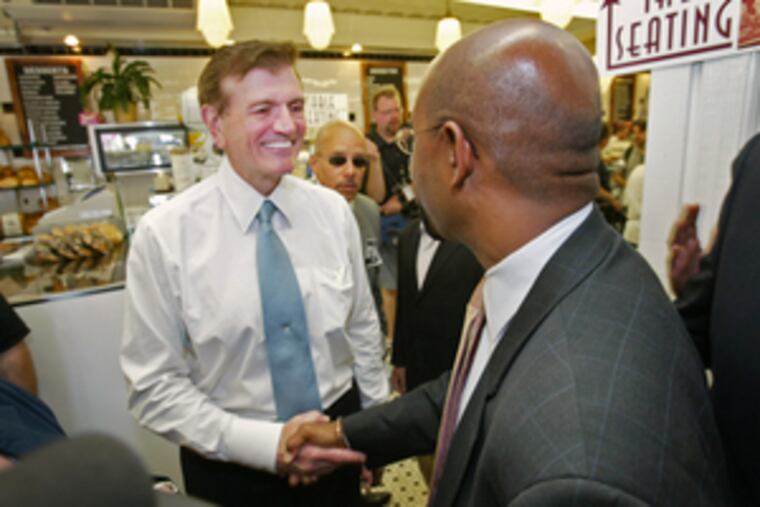Dem: Pa. should OK finance limits
State Sen. Williams pushes bill that would undercut court appeal by Fattah

State Sen. Anthony Williams says the city's new campaign-finance rules proved themselves in this year's Democratic primary and deserve protection from a challenge in the state Supreme Court.
Williams, the ranking Democrat on the Senate committee that deals with state election laws, said yesterday that he will push for prompt Senate action on a bill giving Philadelphia authority to set its own limits on campaign contributions.
"If Tom Knox had won the Democratic nomination, we probably would have had pushback [against the proposed law and contribution limits]," Williams said.
"Now that we know that money influences, but doesn't necessarily buy elections, the measure is probably going to get a lot more favorable treatment," Williams continued. "It's clear that people want to have change."
Under an ordinance originally passed by City Council in 2003, candidates for mayor and other city offices faced contribution limits this year for the first time.
While Knox funded his campaign with more than $10 million from his personal fortune, other mayoral candidates could accept no more than $5,000 from individuals, or $20,000 from political-action committees, labor unions, law firms and other organizations.
The limits appear to have held down spending in this year's race for mayor, but not in the wholesale way that some critics predicted.
Not counting the $10 million that Knox threw into his own campaign, the five top candidates for mayor raised about $13.4 million for this year's Democratic primary - almost as much as the $14.7 million that the five top Democrats raised for the last contested mayoral primary in 1999.
Michael Nutter raised nearly $4 million, Dwight Evans about $3.5 million, Bob Brady $2.8 million and Chaka Fattah just over $2 million, according to their campaign finance reports. Knox raised about $1.2 million from other people's checkbooks.
Nutter's media consultant, Neil Oxman, estimated that the cost of TV advertising had climbed 15 percent to 20 percent since 1999. But he also estimated that the other Democratic candidates could have raised another $4 million or $5 million this year if they'd worked as hard as Nutter did.
"Michael Nutter and Dwight still raised a significant amount of money, but without the obscene amounts some people have given in the past," said Williams, who supported Evans in the primary.
"You have to work a lot harder as a candidate to raise money, but in the end it puts you in more contact with more people, which is a good thing," Williams continued.
"The citizens and voters of Philadelphia can feel much more comfortable that the next mayor will not necessarily be influenced by one law firm or one individual because they gave significant amounts," he said.
Commonwealth Court upheld the city's new limits with a 6-1 decision in April. Because state law is silent on the issue, Philadelphia has the right to set contribution limits of its own, the court said.
Fattah appealed the decision to the state Supreme Court. His lawyer, Gregory Harvey, is scheduled to file his brief against the city ordinance next month. The city will get time to respond, and the Supreme Court would likely decide the case later this year.
A spokeswoman for Fattah, Rebecca Kirszner, said yesterday that Fattah intends to pursue the appeal, in spite of his fourth-place finish in this week's primary.
"Congressman Fattah thought the city campaign-finance laws were unconstitutional a few weeks ago and still does today," Kirszner said by e-mail to the Daily News.
The pending legislation in Harrisburg was originally sponsored by another mayoral candidate, state Rep. Dwight Evans, and cleared the state House in March by a 112-84 vote.
If passed by the Senate and signed into law by Gov. Rendell, it would torpedo Fattah's appeal by stating explicitly that the city has the right to set contribution limits.
For now, the bill is sitting in the Senate State Government Committee, on which Williams is the ranking Democrat. Chairman Jeffrey Piccola, a Republican attorney from suburban Harrisburg, could not be reached for comment on the bill. *